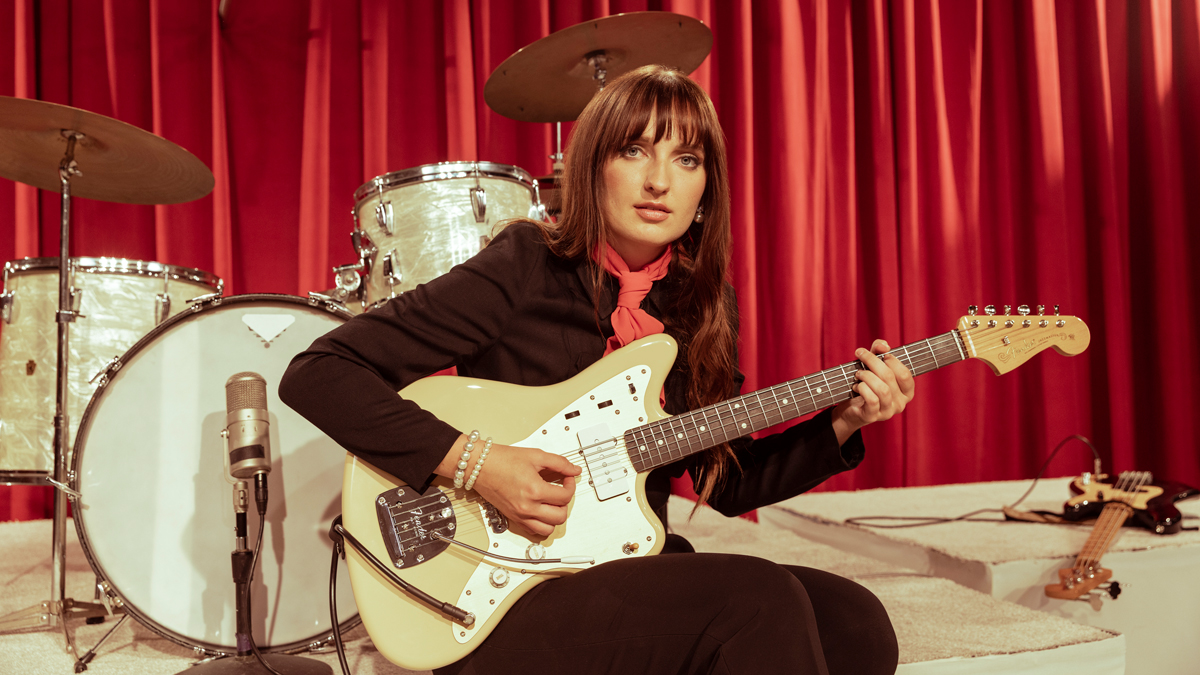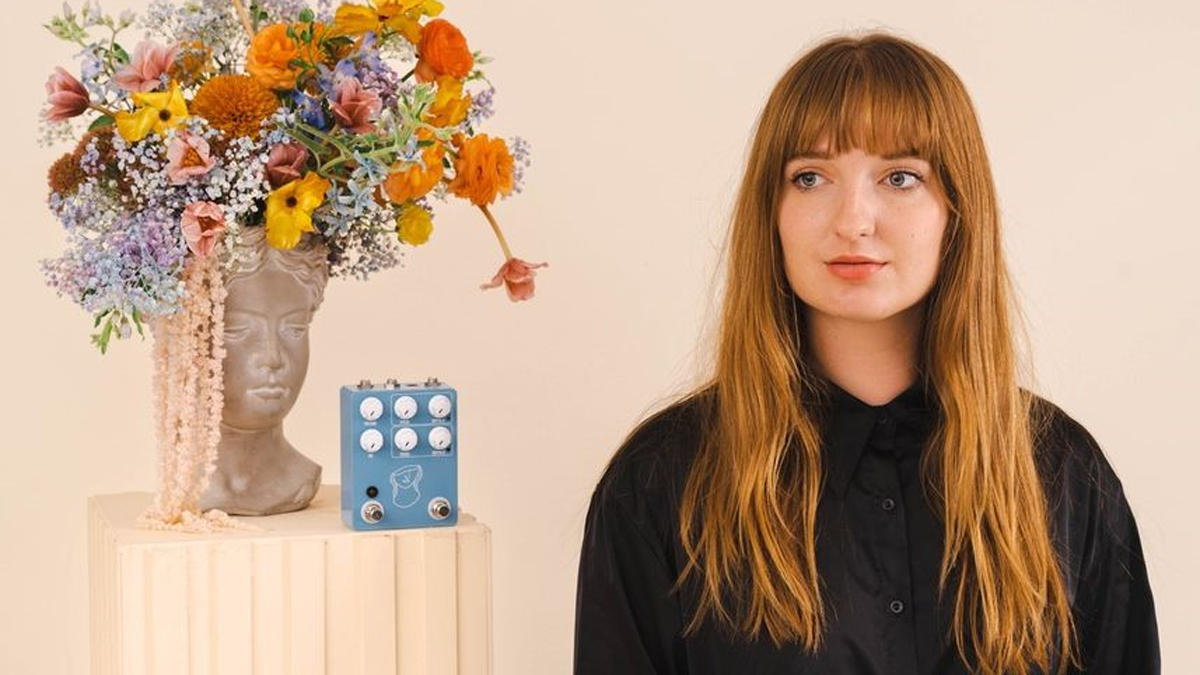“Wendy Melvoin is a highly influential guitarist for me. Her feel is unmatched”: Madison Cunningham is the new face of the Fender Jazzmaster – and she has some seriously A-list collaborations in the pipeline
Hand-picked by Fender to head up its Vintera II campaign, the Grammy-winning folk-rock trailblazer discusses her spellbinding collab with Prince’s guitar player, challenging the Big F’s premier offset to a game of drop-tuning limbo, and how a mutual love of JHS Pedals introduced her to John Mayer

All the latest guitar news, interviews, lessons, reviews, deals and more, direct to your inbox!
You are now subscribed
Your newsletter sign-up was successful
The last 12 months or so have been something of a whirlwind for L.A-based guitarist and songwriter, Madison Cunningham. Since the release of her sophomore album, Revealer, in September of 2022, she’s become a Grammy award-winning artist, released her first signature effects pedal with JHS and secured high-profile tour support slots with the likes of Hozier and John Mayer.
“It’s a total trip, but it's been a special ride so far,” she smiles, speaking from the back of a tour bus early one morning, while out on the road in North America with the Take Me to Church songsmith.
Madison has a magic touch for balancing astute, self-examining songcraft with a penchant for altered tunings, unusual time signatures and complex rhythms, to which she adds sweetly spun melodious toplines and a healthy dose of California cool. A pro multi-tasker, she makes difficult things look easy – and that’s surely the mark of a skilled practitioner of any art form.
Most recently, her talents have caught the attention of Fender, and alongside the likes of ex-Red Hot Chili Pepper Josh Klinghoffer and Snail Mail’s Lindsey Jordan, she’s become one of the faces of the guitar giant’s all-new Vintera II series campaign.
Marketed as “vintage style for the modern era”, the Vintera II series of guitars and basses pays homage to classic designs from the ‘50s, ‘60s and ‘70s and includes – among other things – multiple Strats and Teles, a ‘60s Bass VI, a ‘70s Competition Mustang and ‘70s Jaguar, as well as the ‘50s Jazzmaster that Madison is championing.
“I was really, really excited when the opportunity came up because obviously Fender means a lot to everybody and it means a lot to me,” she tells us. “That’s what I play. My main guitar is a Fender and when I heard that they were reissuing some of the first ‘50s models – which were the first models basically ever made of the Jazzmaster – I was really excited to lend my voice to that in any way.”
In fact, when it was first released way back in 1958, the Jazzmaster was advertised as providing “the ultimate in electric Spanish guitar versatility,” so it seems only right that such an instrument should wind up in the hands of a player like Madison, who has also used American Ultra, American Original ‘60s and Classic Player Special models at various points in her career to date.
All the latest guitar news, interviews, lessons, reviews, deals and more, direct to your inbox!
“I feel quite at home with the Jazzmaster shape and feeling, and it’s been fun to notice very subtle differences in the ‘50s Jazzmaster as opposed to the modern reissue that I play now,” she ponders. “I found those little tiny comparisons to be inspiring.”
At its core, the Vintera II ‘50s Jazzmaster features an alder body and a maple neck, a pair of vintage-style ‘50s Jazzmaster single coils, a vintage-style floating tremolo bridge and late-‘50s C-shape neck with a 7.25” radius rosewood fingerboard and vintage tall frets.
“The body on the Vintera II Jazzmaster is a little bit heavier, but playing it felt a little bit lighter than playing my other guitar, which is interesting,” notes Madison. “But, it’s not much. Not much has really changed!”
I feel like Wendy Melvoin holds down this lane of being a fiercely melodic player, but also really, really rhythmic, and her feel is unmatched. I’ve always looked up to her in that way
As she puts it in the campaign trailer, “It’s rare that anyone gets it right the first time around but Fender did,” and that’s precisely what these models are here to prove.
To celebrate the range, Fender is also drip-feeding a three-part video series called Best of the Decades, featuring iconic songs from the ‘50s, ‘60s & ‘70s performed by a contemporary player and a legendary artist. In Madison’s case, it’s a cover of I Only Have Eyes for You by The Flamingos, performed with Wendy Melvoin of Prince’s backing band The Revolution, who chooses the Vintera II ‘50s Nocaster.
“She’s a highly influential guitarist for me,” enthuses Madison, who says she could think of no better six-string legend to be paired with for the ‘50s pop classic. “I feel like she holds down this lane of being a fiercely melodic player, but also really, really rhythmic, and her feel is unmatched. I’ve always looked up to her in that way. She was the first person I thought of and she reacted immediately and was like, ‘Yes! Let’s do this.’”
The video oozes ’50s cool, with a faux vintage TV show backdrop, warm vintage tones and, of course, some ace guitar playing from both parties.
Madison is partial to tuning her guitars down two full steps to drop C standard – among other adventurous alterations – so we couldn’t help but wonder if the Vintera II Jazzmaster’s authentically old-school floating tremolo bridge system coped well with being de-tuned and strung up slack ’n’ low. With a little light adjustment to prevent potential buzzing, she’s happy to report that it indeed “got to a place where it was not complaining about being in drop C”.
“It was a good test for it,” she smiles. “Like challenging it to a game of limbo!”
Whether wielding the Vintera II, her trusty workhorse Jazzmaster – which she describes as “so tailored to me now” – or even the Harmony Juno that she brings out for certain songs, Madison’s sound is never complete without the slow undulating wooze of her Artificial Blonde Signature Vibrato pedal, which came out last October. So, we turn our attention to the other most important gear brand in her life right now: JHS Pedals.
Before embarking on her first foray into pedal development, Madison had been a longtime user of the JHS Emperor Analog Chorus/Vibrato – the pedal upon which her own design is based – and had become friends with JHS mastermind himself, Mr. Josh Scott.
Together, they set out to capture the “really defined” sweet spot settings that Madison always used and package them up in a neat and aesthetically pleasing pale blue box of her own. Also loosely inspired by the classic dual-speaker sound of vintage Magnatone amps, The Artificial Blonde is a slightly 3D-sounding pitch vibrato with two easy-to-access modes for live use.

“Josh is one of the best people that I know and he kind of let me into the whole thing,” effuses Madison, who describes the process as having been as “nerdy and involved” as you’d hope it might be.
“On the Emperor, there’s three different modes: there’s a very, very fast tremolo, there’s a very seasick tremolo and then a real sharp tremolo,” she says of her original muse. “You can toggle between them, but I just kind of used this one sound in it and got it to this one place that I really liked.”
While setting up for any given show, Madison would mark her settings with a Sharpie and leave the pedal on for the duration of her set. It truly became her signature sound.
The Artificial Blonde really is a signature pedal because it’s on every night. I never play a show without it
“Basically, Josh and I went back and forth on what those settings actually were for a couple of months and that’s how we ended up cooking up the sounds for the Artificial Blonde,” she adds. She then road-tested a prototype version called “Blonde?” for a good year before settling on the finished design.
“It really is a signature pedal in that way because it’s on every night. I never play a show without it,” she smiles. “It can be as subtle or as dynamic as you want it, but I keep it pretty in the background as this slow, slight seasickness that is always happening.”
The rest of her ‘board was also put together for her by JHS, and contains the company’s delay, distortion and boost pedals, as well a DigiTech Whammy for pitch-shifting goodness.
Through her relationship with JHS, Madison also found herself becoming acquainted with John Mayer, and she’ll soon be preparing to head out on tour with the blues-pop megastar in the UK and Europe next spring.
“Josh had sent him my music and John had responded well to it,” she recalls. “I remember seeing that he had followed me on Instagram, and I was like, ‘Okay… interesting!’
John Mayer is just a very wise, kind, generous artist. Any time I’ve asked for advice, he’ll respond and always has something important to say
“Then we just kind of struck up a conversation on social media that would go on and off throughout the years. Finally, we met each other and started hanging out a little bit and then the tour came about. It kind of just naturally happened.”
Over the years, Mayer has not only become a vocal champion of Madison’s music, but also a personal mentor of sorts.
“He’s given me a lot of advice on songwriting and sort of just going toe to toe with the music industry,” she reveals. “He’s just a very wise, kind, generous artist. Any time I’ve asked for advice, he’ll respond and always has something important to say.”
Having cut a stunning acoustic cover version of Mayer’s Age of Worry for her 2020 Wednesday EP, we speculate as to whether there might be a special duet abrewing for the tour that lies ahead.
“We’re talking about doing some stuff, so we’ll see what ends up metabolizing,” she smiles, without giving too much away. “But that could be a contender!”
- For more information on the Vintera II range, head to Fender.com.
Since graduating university with a degree in English, Ellie has spent the last decade working in a variety of media, marketing and live events roles. As well as being a regular contributor to GuitarWorld.com, she currently heads up the marketing team of a mid-scale venue in the south-west of England. She started dabbling with guitars around the age of seven and has been borderline obsessed ever since. She has a particular fascination with alternate tunings, is forever hunting for the perfect slide for the smaller-handed guitarist, and derives a sadistic pleasure from bothering her drummer mates with a preference for wonky time signatures.

